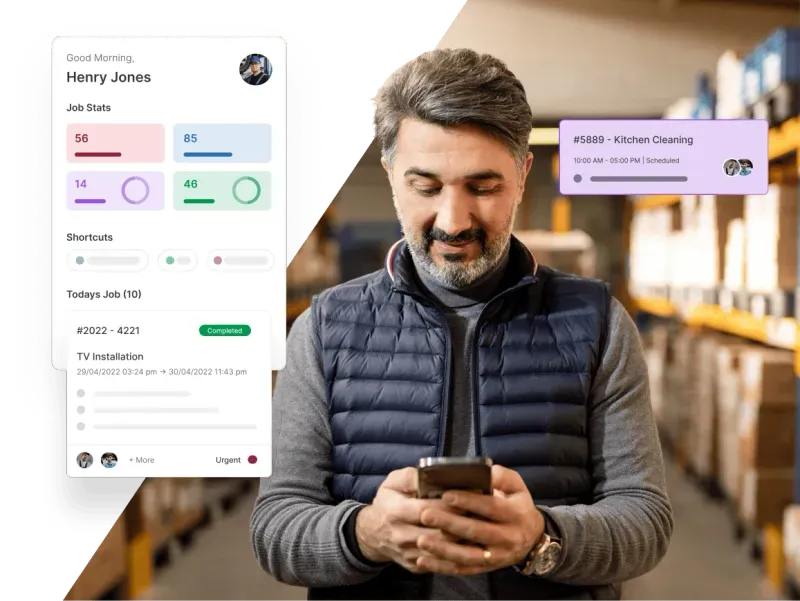Field Service Mobile App: Transforming Efficiency in Service Management
Field service mobile apps have transformed the way companies manage their operations in the field. These applications streamline processes, enhance communication, and improve efficiency for service teams, making them essential tools for modern businesses. By integrating scheduling, dispatching, and real-time updates, these apps empower technicians to perform their tasks more effectively.
Adopting a field service mobile app can lead to significant improvements in customer satisfaction. With features like instant access to service history and customer information, technicians can provide more personalized service, addressing issues swiftly and accurately. This capability not only saves time but also fosters stronger relationships with clients.
The increasing reliance on mobile technology in various industries highlights the importance of these applications. Companies looking to stay competitive must consider the advantages offered by field service mobile apps. Embracing this technology can lead to better resource management and ultimately drive growth and profitability.
Key Features of Field Service Mobile Apps
Field service mobile apps play a critical role in enhancing operational efficiency and customer satisfaction. They come equipped with essential features that streamline various processes, enabling organizations to respond quickly and effectively to service demands.
Work Order Management
Work order management is vital for any field service operation. Field service mobile apps allow technicians to receive, manage, and update work orders directly from their mobile devices. This capability ensures real-time visibility into the status of tasks, leading to improved productivity.
Users can prioritize work orders, assign tasks to specific technicians, and even set deadlines. Advanced features include automated reminders and notifications, which help reduce delays. Furthermore, the ability to capture signatures upon task completion aids in maintaining accurate records for billing and service history.
Real-Time Communication
Real-time communication is essential for effective field service management. Mobile apps enable instant messaging and voice communication among team members, ensuring that technicians can easily reach support staff or other technicians when needed.
This feature allows for quick troubleshooting and decision-making, which can significantly reduce downtime. Including a centralized communication platform also helps keep all parties informed about changes, updates, or emergencies. With real-time collaboration, service teams can enhance coordination and improve response times, leading to better overall service delivery.
Inventory Tracking
Inventory tracking features in field service mobile apps provide a comprehensive view of stock levels and availability. Technicians can access real-time data on parts and supplies, ensuring that they have what they need for each job.
Through barcoding or RFID scanning, users can update inventory records instantly, reducing inaccuracies and eliminating excess stock. Alerts for low inventory levels can help avoid delays in service due to missing parts. Moreover, integrating inventory management with work order systems can streamline procurement processes, ensuring that essential items are restocked efficiently.
Customer Relationship Management
Customer relationship management (CRM) features in mobile apps are crucial for maintaining strong client relationships. These tools enable service technicians to access customer profiles, service histories, and preferences while on-site.
Having this information readily available allows technicians to personalize their interactions and provide better service. Moreover, mobile CRMs can facilitate follow-up communications and automate customer feedback collection. This integration leads to improved service quality and increased customer satisfaction, as clients feel valued and understood.
Offline Accessibility
Offline accessibility is an essential feature for field service mobile apps, ensuring that technicians can continue working even in areas with poor connectivity. This functionality allows users to view and update job details, complete work orders, and access customer information without relying on an internet connection.
When reconnected, all data automatically syncs with the central system, maintaining consistency. This capability not only enhances productivity but also ensures that service interventions are not hindered by technical limitations. For field technicians, having offline access means they can remain effective under various working conditions.
Challenges and Solutions in Field Service Mobility
Field service mobility presents specific challenges that companies must address to enhance efficiency. Key areas include data security, integration with existing systems, technician training, and user experience optimization.
Ensuring Data Security
Data security is paramount in field service mobility. Mobile applications often handle sensitive customer information and operational data. To mitigate risks, companies should implement strong encryption protocols for data storage and transmission. Regular security audits can identify vulnerabilities before they are exploited.
Additionally, employing multi-factor authentication (MFA) adds a level of protection against unauthorized access. Employee training on data security best practices further strengthens overall defenses. Ensuring compliance with regulations, such as GDPR or HIPAA, is also crucial for maintaining trust and preventing legal penalties.
Integrating with Back-Office Systems
Integration with back-office systems can streamline operations but poses significant challenges. Companies often utilize different software platforms for customer relationship management (CRM), inventory, and scheduling. Lack of interoperability can lead to data silos and inefficiencies.
Utilizing middleware or application programming interfaces (APIs) can facilitate smoother data exchange between mobile apps and existing systems. Assessing the compatibility of new solutions with current infrastructure is vital before implementation. Organizations should prioritize solutions that offer seamless integration capabilities to optimize workflows.
Training Field Technicians
Training field technicians is essential for maximizing the effectiveness of mobile applications. Many technicians may not be familiar with advanced technology, necessitating comprehensive training programs.
Interactive and hands-on training sessions can improve retention of information. Regular refresher courses keep staff updated on new features or security protocols. Support resources, such as user manuals and quick-reference guides, can empower technicians to troubleshoot issues independently, enhancing their confidence in using the app.
Optimizing User Experience
User experience plays a critical role in the success of field service mobility solutions. Applications must be intuitive and user-friendly to minimize resistance among users. Simplifying navigation and reducing the number of steps to complete tasks can enhance efficiency.
Gathering feedback from technicians can provide insights into usability issues. Regular updates based on user input can help iteratively improve the software. Ensuring compatibility across various devices and operating systems further enhances accessibility, enabling technicians to work efficiently under varying conditions.

